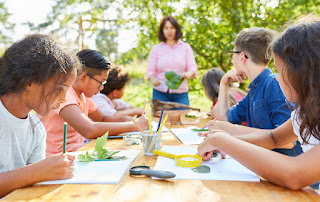It is no secret how hard the last year or so has been. Teachers and students suffered and struggled. Everyone did their best in uncharted waters. The pandemic changed how we lived, taught, and learned. Now it is time to regain some sense of normalcy, which everyone is excited about. But how?
Researchers have figured out that holding students back a grade doesn’t solve any gaps in learning. Rather, it fosters apathy and boredom. Wrangling bored students to care about concepts they feel they have already learned is every teacher’s worst nightmare.
Use real world tasks to assess deep learning. For example, have them plan something that has a budget to see where they stand with basic math skills. You could have them work together in teams to see where their social skills need work. Reading parts in a play out loud is an easy way to see how their reading skills are progressing.
Refresh Before Test
Tests don’t always reflect what students know. They may have learned something, but need a refresher. Quickly go over what they should already know before testing them. Give them a chance to get in the swing of things before throwing a standardized test at them that may not reflect their actual knowledge.
Focus on Gains
Students may be behind in math and science this year. But what have they learned? Some students will be much better at time management and self-direction. Some learned better technology skills. When students had the ability to learn at their own pace, many were more self-motivated. The most beautiful gain? The majority of students said that they missed going to school. Socializing is such an important part of what is taught at school. Try to incorporate social aspects of learning to celebrate the fact that students are back together in the classroom.
Mind the Gaps
Try to identify the necessary prerequisite concepts that need to be taught before moving on. When there is disparity between levels, set up learning groups to reflect what they need to focus on. That way students can concentrate on learning the building blocks that they need to progress. Incorporate spiral learning into your teaching method, reintroducing important concepts throughout the school year.
Utilize Your Community
One teacher just can’t teach to the level of every child. Look into community programs that will help children before or after school. See if your school is willing to offer after school tutoring or summer school courses. Work with local colleges to help families find affordable tutors. Ask parents to volunteer their time to work with students during class time. Facilitate students getting extra credit to tutor students who need a little extra help.
It Takes a Village
We all want to see our teachers and children succeed. Remember that you aren’t alone. Emotional and mental health of students has been in the forefront lately because we understand it is key for their ability to learn. Your health is necessary in your ability to teach. Reach out for help from fellow teachers, friends, family and therapists. Your community needs you and we have your back!
BASIC SKILLS SUGGESTIONS:
https://www.remediadigital.com/beginning-basic-skills-recognizing-coins-ebook
https://www.rempub.com/easy-sentence-writing
https://www.rempub.com/high-interest-reading-3-book-set
https://www.rempub.com/skill-booster-series









